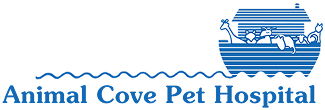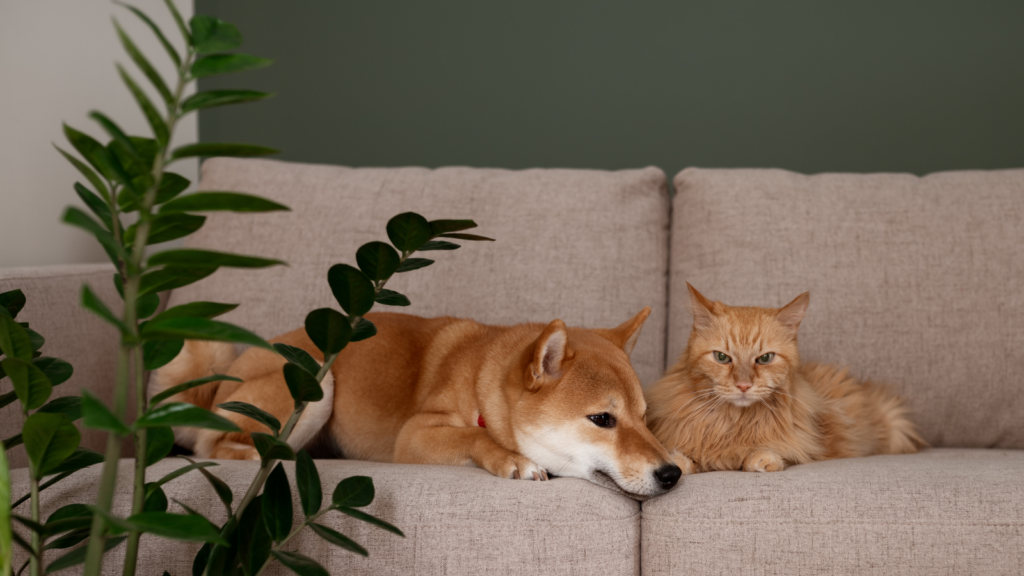March is Pet Poison Prevention Month, a time dedicated to educating pet owners about common household toxins that can pose serious risks to their furry companions. Many everyday items, from certain foods to household cleaners and even plants, can be dangerous if ingested by pets. At Animal Cove Pet Hospital, we want to help you recognize these risks and take proactive steps to keep your pet safe.
Common Household Poisons That Put Pets at Risk
Pets are naturally curious, and their exploration can sometimes lead them to ingest harmful substances. Some of the most common pet toxins include:
Human Foods That Are Toxic to Pets
- Chocolate contains caffeine and theobromine, which can cause vomiting, rapid heart rate, and seizures in dogs and cats.
- Grapes and raisins can lead to sudden kidney failure, even in small amounts.
- Xylitol, a sugar substitute found in sugar-free gum, baked goods, and some peanut butters, can cause life-threatening hypoglycemia and liver damage in dogs.
- Onions and garlic can destroy red blood cells and lead to anemia in both dogs and cats.
- Alcohol and caffeine can cause severe neurological and cardiovascular issues.
Household Products That Can Poison Pets
- Over-the-counter and prescription medications, including ibuprofen and acetaminophen, can be fatal to pets if ingested.
- Cleaning products such as bleach, disinfectants, and some essential oils can cause poisoning through ingestion or inhalation.
- Rodenticides and insecticides can be lethal if consumed by pets.
- Antifreeze contains ethylene glycol, which is highly toxic and can cause kidney failure.
Plants That Are Toxic to Pets
- Lilies are extremely dangerous to cats and can cause kidney failure even with minimal exposure.
- Sago palms are toxic to both dogs and cats, with ingestion potentially leading to liver failure.
- Tulips and daffodils contain toxic substances that can cause vomiting, diarrhea, and heart issues.
- Aloe vera, while beneficial for humans, can cause digestive upset in pets.
Signs of Pet Poisoning
If your pet has ingested something toxic, symptoms may develop quickly or over time. Common signs to watch for include:
- Vomiting and diarrhea
- Excessive drooling or foaming at the mouth
- Loss of appetite
- Lethargy or weakness
- Tremors, seizures, or difficulty walking
- Difficulty breathing
If you notice any of these symptoms, seek veterinary care immediately. Animal Cove Pet Hospital offers same-day urgent care appointments for pets in need. Call us at (650) 377-0822 for assistance.
How to Prevent Pet Poisoning
Preventing exposure to toxins is the best way to keep your pet safe. Here are some important safety measures to follow:
- Store medications, cleaning products, and chemicals in secured cabinets out of your pet’s reach.
- Keep human foods, especially chocolate, grapes, onions, and anything containing xylitol, away from pets.
- Research houseplants before bringing them home to ensure they are non-toxic to pets.
- Avoid using pest control products or antifreeze in areas where your pet has access.
- Supervise outdoor activities to prevent ingestion of unknown plants or chemicals.
- Educate family members about which items can be dangerous to pets.
What to Do in a Pet Poison Emergency
If you suspect your pet has ingested a toxic substance, act quickly by following these steps:
- Identify what your pet ate, how much, and when it was ingested.
- Do not induce vomiting unless instructed to do so by a veterinarian. Some substances can cause more harm when vomited.
- Call Animal Cove Pet Hospital at (650) 377-0822 for immediate assistance.
- You can also contact the Pet Poison Helpline at (855) 764-7661 for expert guidance.
Urgent Care for Pet Poisoning
At Animal Cove Pet Hospital, we understand that emergencies can happen at any time. That’s why we offer same-day urgent care for pets experiencing poisoning symptoms or other medical emergencies. If you believe your pet has been exposed to something toxic, call us right away for an urgent care appointment.
March is the perfect time to evaluate your home for potential pet poisoning risks and spread awareness to other pet owners. By staying informed and prepared, you can help prevent dangerous situations and keep your pet safe.
For any concerns or urgent care needs, contact Animal Cove Pet Hospital at (650) 377-0822. We are here to help when your pet needs us most.

